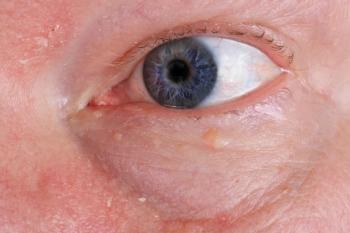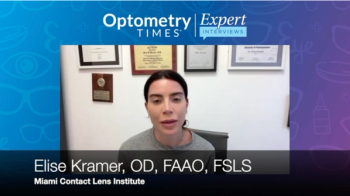
Students can make a difference with advocacy
As I reach the end of my second year out of optometry school, I find myself reflecting on how the past two years have been such a rewarding experience.
As I reach the end of my second year out of optometry school, I find myself reflecting on how the past two years have been such a rewarding experience.
I’m thankful for the education I received that has equipped me to give my patients the best care possible. I want to thank all of my professors and clinical instructors for their time and commitment to shaping the future of optometry; it is to them I owe recognition and appreciation for my clinical knowledge and skill.
Previously from Dr. Harmin:
The importance of advocacy
Some lessons I learned about this wonderful profession were not taught in the classroom, however, and one of those is the importance of advocacy. Advocacy is defined as public support for or recommendation of a particular cause or policy. Advocacy can be as simple or as involved as you want it to be, but in order to effectively advocate, you need to understand your purpose, or cause.
As doctors of optometry, we live and breathe ocular health. We spend four years after undergrad studying a myriad of subjects pertaining to vision and ocular disease. Once we receive our doctorate, we attend hours of continuing education lectures every year. We see patients, read journal articles, and participate in discourse with our colleagues on a daily basis.
With all of this knowledge and exposure, the importance of a yearly eye exam is a no-brainer to us, and it is easy to forget that the public has very little, if any, education on the importance of ocular health. Unfortunately, many people view the eye doctor as someone they see every few years when they need a new prescription for glasses or contact lenses. The sad reality is many individuals who do not need glasses to see will go most of their lives without an eye exam.
Advocacy benefits
Having this realization as an optometry student was daunting, but it also ignited a passion in me to be an advocate for the profession to a degree I never imagined. It gave me the will to reach out to my peers with information on ocular health, to lead as a student advocate, and to one day serve and educate my patients and community as a practicing optometrist.
Optometry’s role in the world was clear to me since the day I suffered a traumatic eye injury that resulted in a period of frequent optometric care. The first year in optometry school only strengthened my outlook as the curriculum delved into the many systemic disorders linked to our eyes.
Related:
This knowledge was enough for me to question why the public undervalues optometry and spurred my activism in the American Optometric Student Association (AOSA). I committed to attending the 2012 American Optometric Association (AOA) Congressional Advocacy Conference in Washington, DC, after which I accepted the appointed position of AOA political action committee (PAC) liaison with the responsibility of garnering support for optometry’s PAC, and coordinating Ohio State’s involvement in the 2013 AOA Congressional Advocacy Conference.
In order to create success now, it is important to educate yourself on the policies and legislation that greatly affect your scope of practice. Go out for a leadership position in your school’s AOSA chapter, attend the Congressional Advocacy Conference, donate to the PAC, and form a relationship with your state association or the state association where you plan to practice.
As a result of the path I took as a student, I had the pleasure of meeting Rick Cornett, a charismatic and inspirational man who was the executive director of the Ohio Optometric Association during my time in optometry school. Mr. Cornett realized the true value of vision and how instrumental optometry is in preserving this precious gift. His passion resonated in his words, whether he was speaking to students, a school nurse, or a state senator.
Related:
As a student, I had the privilege of joining Rick on a few occasions where we met with important figures in the Columbus, OH, community to discuss the benefits and services optometrists can provide the public. Showing interest in public concern and forming a relationship with your state association will result in exposure to aspects of optometry that are not part of the academic curriculum in school and will propel you forward in your career.
The events I attended with Mr. Cornett provided me an opportunity to network with and learn from a variety of community leaders in and outside of the profession. I met businessmen, politicians, engineers, and physicians, to name a few. In addition, I met many leaders in the field of optometry who shared a passion for moving the profession forward. It was pleasantly surprising to see how tight knit the optometry community really is and how willing each member is to help one his fellow colleagues.
Students, get involved
The Congressional Advocacy Conference was a turning point for me, and it resulted in a lifestyle of involvement and advocacy. Getting involved in organized optometry while in optometry school is a rewarding way to create success now.
It’s a great way to stay educated on the policies and regulations that affect the optometric scope of practice but are seldom touched upon in the optometry school curriculum. Understanding these policies and keeping up with changes will give students a greater understanding of the big picture and hopefully provide a macroscopic lens to sharpen practice management skills.
Related:
Getting involved in organized optometry also introduces students to some of the most passionate leaders in the field. These leaders often have cutting-edge practices and are usually willing to help create opportunities for the next generation.
Most importantly, getting involved in organized optometry helps all patients. Optometrists can serve only the patients who step into their offices-but impacting legislation helps far more.
With pressure from online vendors like 1-800 contacts, online services like Opternative, and certain medical professions, the need to be informed and involved is more important than ever. Starting early as a student is wonderful, and it is imperative that you don’t lose momentum as you graduate and begin to establish yourself in practice.
Related:
If optometrists are unified, there is no limit to the great progress we can accomplish for our patients, but we have to stay involved. Take the extra steps to meet with your state legislatures, attend the AOA advocacy conference, educate your community-because if you are not at the table, you’re on the menu.
I encourage all optometry students to give thought to getting involved with organized optometry as a means of accelerating individual success for a better future. Advocacy for our profession has many avenues and takes many forms, be it a grand gesture or a small conversation, but in the end, it is simply the act of educating the public on the importance of ocular health.
One can be the greatest clinician, but without advocating for your profession, you are saving the sight of only those who come through your practice doors. What about the countless others who do not know any better? We are blessed with the knowledge to save sight. Let’s share this knowledge, and serve our patients to our full potential.
Newsletter
Want more insights like this? Subscribe to Optometry Times and get clinical pearls and practice tips delivered straight to your inbox.













































